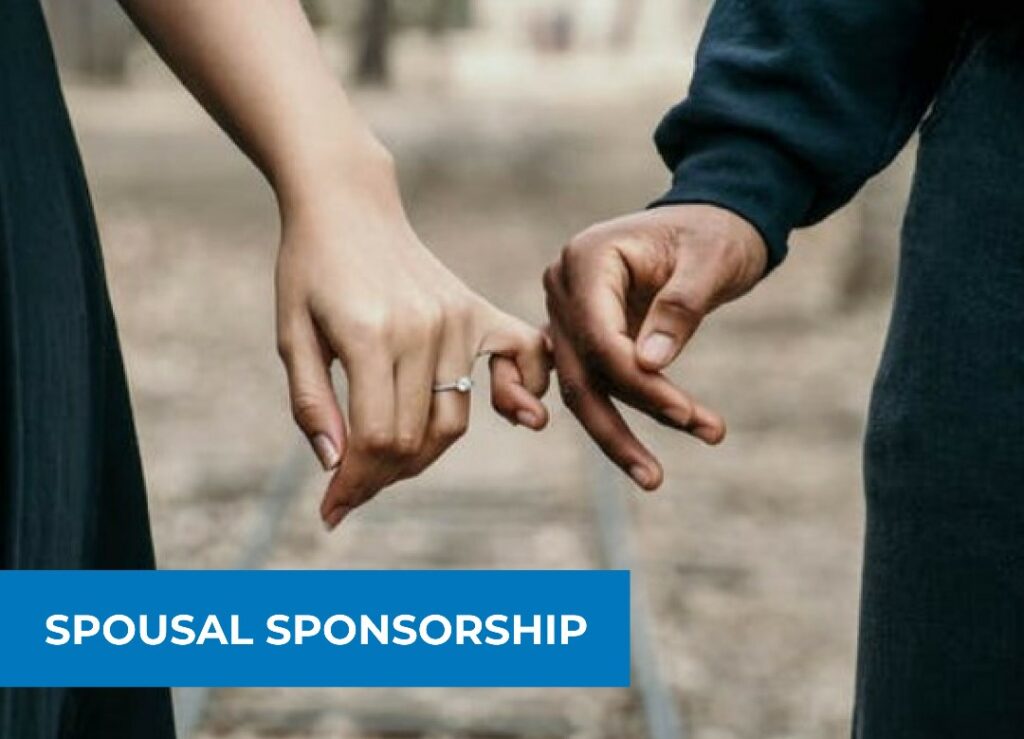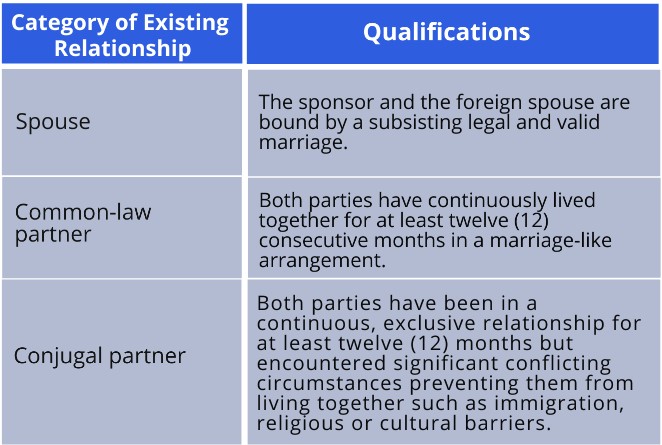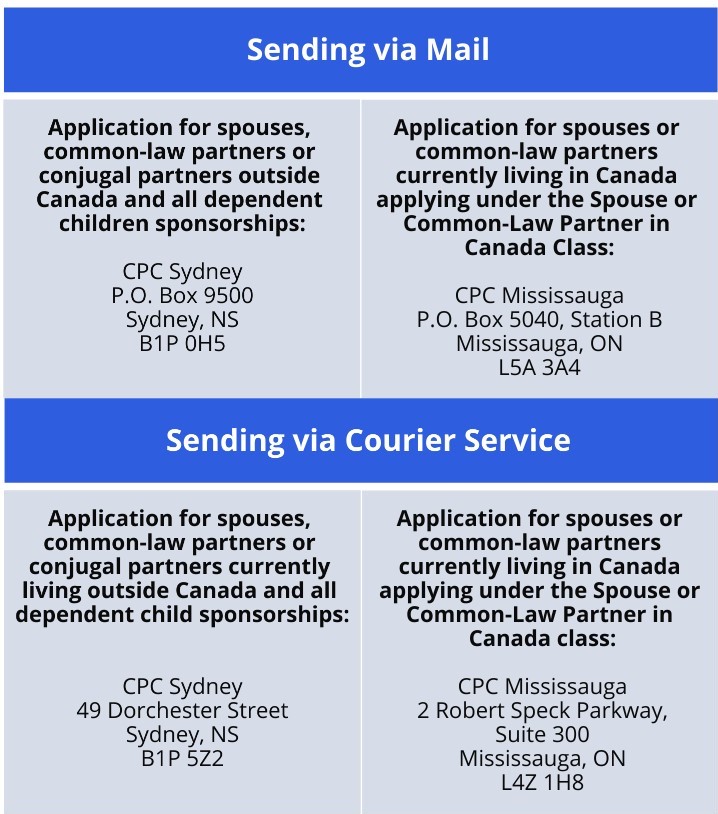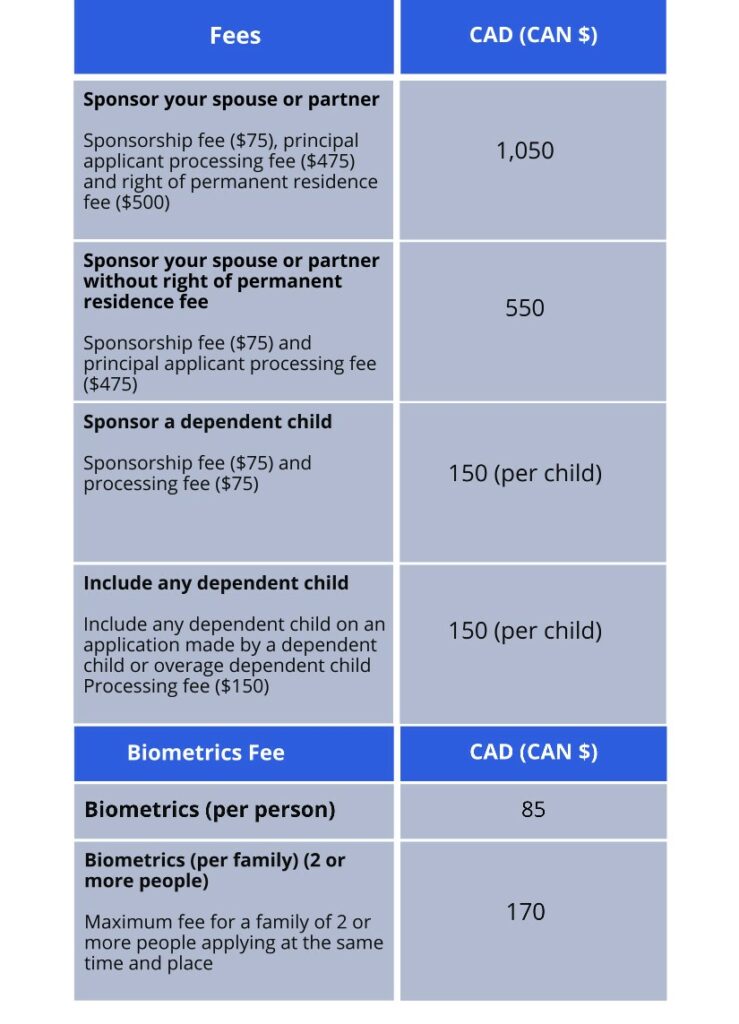Sponsor Your Spouse or Partner in Canada

Spousal sponsorship is a type of family immigration application process wherein a Canadian citizen or permanent resident sponsors his or her foreign spouse, common-law partner or conjugal partner to come and live permanently in Canada.
As to who can be subject to this kind of sponsorship, the scope is no longer confined to just the legal husband or the wife. One can receive a residence under this family immigration program as long as the sponsor and the foreign spouse or partner can prove the authenticity of their marriage or an existing common-law or conjugal relationship.
There are two (2) main options to choose from when it comes to Spousal Sponsorship, namely:
- Outland Spousal Sponsorship – used when the foreign spouse lives outside of Canada.
- Inland Spousal Sponsorship – used when the foreign spouse lives with the Canadian sponsor in Canada and holds a valid temporary immigration status either as a worker, student, visitor, or in some instances, even if the foreign spouse is out of status. Only parties living in Canada can choose this option.
Overview of the Process
There are two (2) parts to the preparation of an application package for Spousal Sponsorship:
- Application to become a Sponsor; and
- Application to acquire permanent residence status for the Sponsored Foreign Spouse
Note: Both of these steps are performed and accomplished simultaneously. Submission of all applications are coursed to the Immigration, Refugees and Citizenship Canada (IRCC) for approval. The IRCC is the approving authority for immigration applications in general.
A general overview of steps in sponsoring one’s spouse is enumerated as follows:
1. Secure and fill out the application package that includes the following:
- A document checklist for both the sponsor and sponsored spouse;
- Forms to be filled out by both parties;
- A list of a country specific documents, depending on the country of residence of the sponsored spouse; and
- An instruction guide as to how to fill up said forms.
2. Pay the requisite application fees, such as:
- processing fees
- right of permanent residence fee
- biometrics fee
- third-party fees, if applicable
Note: Remember to include the payment receipts to your application package before submitting it; otherwise, your application will not be processed.
3. Send your application alongside required documents and accompanying fees by mail:
4. Send additional information as may be necessary or requested by the IRCC.
Canadian Sponsors and sponsored foreign spouses can check the status of their spousal sponsorship application online, once the application has passed the eligibility checks and was given a file number.
Check if you are Eligible to sponsor
Eligibility
To be eligible as a Sponsor, you:
- Must be at least 18 years old;
- Must be a Canadian citizen, a permanent resident of Canada, or a person registered in Canada as an Indian under the Canadian Indian Act
- Is not receiving any social assistance from the government for reasons other than a disability
- Must have the ability to provide for his or her own basic needs, those of the sponsored spouse or partner and the dependent children, if applicable;
Note: “Basic Needs” include:
- Housing and utility bills;
- Food;
- Personal hygiene essentials;
- Clothing;
- Medical expenses not covered by public health insurance like dental and eye care;
- Such other items that are necessary for daily living.
At NO INSTANCE can one sponsor if they are:
- Less than eighteen (18) years of age;
- Will not live in Canada when the sponsored foreign spouse becomes a permanent resident;
- Is not a Canadian citizen, a permanent resident of Canada or a person registered in Canada as an Indian under the Canadian Indian Act;
- Is a temporary resident only;
- Has a permanent residence application that is still being processed or pending approval;
- Does not have any financial means to support the sponsored foreign spouse and dependent children, if applicable.
Note: One must already have a permanent resident status at the time of the submission of the sponsorship application.
One can be held INELIGIBLE to sponsor a spouse or partner, the sponsor:
- Was previously sponsored by a spouse or partner and became a permanent resident less than five (5) years ago;
- Is still financially responsible for a previous sponsored spouse or partner*;
- Has already applied to sponsor and a decision on that pending application still has not been made;
- Is in jail, prison or a penitentiary;
- Has an outstanding obligation to pay back an immigration loan, a performance bond, a court-ordered family support payment such as alimony or child support.
- Did not give the financial support agreed upon signing of a sponsorship agreement to sponsor someone else in the past;
- Receives social assistance for reasons other than disability;
- Is convicted of attempting, threatening to commit or committing a violent criminal offense, any offense against a relative or any sexual offenses committed inside or outside of Canada;
- Cannot legally stay in Canada and must leave the country pursuant to a removal order.
If the sponsor is a Canadian citizen living outside of Canada, additional evidence is required. For example, they declare intent to reside in Canada and to some extent, show a detailed plan to live in Canada the moment the sponsored foreign spouse becomes a permanent resident**.
Note*: The sponsor is still bound by the three (3)-year undertaking to take care of the sponsored spouse or partner.
Note**: A permanent resident living outside Canada cannot be a sponsor.
The Sponsored Foreign Spouse, Common-Law Partner or Conjugal Partner can be either sex and must be:
- at least 18 years old
- in an existing relationship with the Canadian sponsor as may be categorized in any of the following:

Opposite and same-gender marriages are recognized for immigration purposes if they legally took place in Canada. In case the marriage happened outside of Canada, the marriage must both be legally recognized in the country where the ceremony took place and in Canada. The IRCC no longer recognizes marriages performed outside of Canada by way of proxy, telephone, fax, internet, and any other form of marriage where one or both parties were not physically present at the actual ceremony.
Sponsored Foreign Spouse Ineligibility
One cannot sponsor a foreign spouse who is considered inadmissible in Canada. In other words, the sponsored foreign spouse must pass all the requisite background, security, and medical checks for the spousal sponsorship application to be approved.
A person can be found inadmissible for different and various reasons such as:
- Security purposes;
- Human or international rights violations;
- Committing or organizing a crime, including membership in organizations that take part in criminal activities;
- Medical conditions;
- Financial reasons;
- Misrepresentations;
- Failure to comply with the Immigration and Refugee Protection Act (IRPA);
- Having an inadmissible family member.
Some of the inadmissibilities can be potentially surpassed. Contact Konan Law for more information about this.
Sponsorship and Undertaking
An undertaking must be signed the moment one agrees to be a sponsor. This undertaking expresses the responsibility and commitment of the sponsor to give financial support for the basic needs of the sponsored foreign spouse and their dependent children, if there are any.
It is important that prior to the signing of the undertaking agreement, the Canadian sponsor must make sure that the foreign spouse to be sponsored will not be needing to ask the government for financial assistance. Once they receive social assistance, the sponsor will have to reimburse the government for all the expenses covered and disbursed to the foreign spouse (and the dependent children, if any) during the time that said sponsor is supposed to be the one legally responsible for doing such.
The undertaking is a binding commitment to support the applicant(s) during its entire duration regardless of any changes in the sponsor’s given circumstances and situation. In other words, the undertaking will remain in effect and will not be cancelled for the length of the undertaking period even if situations change. Example of changes in situations are:
- The sponsored foreign spouse becomes a Canadian citizen;
- Divorce or separation with the sponsored foreign spouse;
- The Canadian sponsor or foreign spouse moves to another province or country;
- The Canadian sponsor suddenly encounters financial problems.
Cancellation of Undertaking
Should the Canadian sponsor change his or her decision after the submission of the sponsorship application and undertaking, a letter expressing such decision must be written and sent to the IRCC before a final decision is made on the file.
The letter can be submitted as an attachment through the IRCC Webform or it can also be sent to the following address as may be appropriate:

Note: An undertaking can only be withdrawn upon IRCC’s approval.
Length of Undertaking
The moment the undertaking takes effect, one’s obligations as a sponsor likewise commences. In cases of spousal sponsorship, the length of undertaking is three (3) years reckoned from the day the sponsored foreign spouse, common-law partner or conjugal partner becomes a permanent resident.
Income Requirement
Most of the time, no income requirement is required to be able to sponsor one’s spouse. Specifically, there is no low-income-cut-off (LICO) for spousal sponsorship. However, a minimum LICO score must be met if the sponsored foreign spouse or partner has a dependent child who also has dependent children of their own. Such minimum LICO score is determined by the Canadian government each year.
If LICO requirements must be met, a Financial Evaluation form (IMM 1283) is needed to be filled out and attached together with the spousal application.
The complete checklist of requirements and guidelines can be found here.
Cost to Sponsor Spouse or Partner
The Table of Fees provided below can be used as a reference as to how much it costs to sponsor a foreign spouse, common-law partner or conjugal partner.

As there are two ways to sponsor one’s spouse: in Canada and outside of Canada, applicability depends on the circumstances of the case:
Outside of Canada is applicable if:
- The sponsored spouse is residing outside of Canada; or
- Lives with the sponsor in Canada but does not plan to stay in Canada while the application is ongoing; or
- During appeal when the initial application for spousal sponsorship was refused or disapproved.
In Canada applies when:
- The sponsored spouse lives with the sponsor in Canada; and
- Has a valid immigration status in Canada or is out of status;
Note: Under these circumstances, the sponsored spouse can apply for an Open Work Permit while the application is pending.
Proof and Documentary Requirements
For individuals applying for spousal sponsorship, immigration officers shall be conducting background checks. Any or all of the following may be offered as proof to establish a spousal, common-law or conjugal relationship:
- Marriage certificate
- Religious wedding certificate
- Declaration of Common-law Union
- Birth certificates or adoption records of children, if there are any
- Proof of registration of marriage with the respective local government authority
And some of the following documents, but not limited to, depending on the circumstances:
- Proof of co-ownership of property
- Joint leases or rental agreements
- Joint bank accounts
- Utility bills containing both names of the spouses or partners, such as gas, electricity, telephone, or other joint utility accounts
- Life and/or property insurance policies
- Driver’s licenses that show the same address
- Pay stubs or tax forms that show residence at the same address
- Joint travel bookings/confirmations, boarding passes, travel tickets and stamps
- Money transfers
- Joint photos and social media highlights
Timeline
In general, sponsorship applications take twelve (12) months of processing time once it has passed eligibility checks. These can take longer depending on a case-to-case basis. For example, in cases where the immigration office requires additional proof of spousal relationship or any additional documents, the application process will be delayed.
Grounds for Disapproval of Sponsorship
Spousal Sponsorship shall be disapproved when:
- Either or both parties are less than eighteen (18) years old and/or blood-related;
- Sponsor will not reside in Canada if the sponsored spouse becomes a permanent resident;
- The sponsor is not a Canadian citizen and neither a permanent resident of Canada nor a person registered in Canada as an Indian under the Canadian Indian Act;
- The sponsor is a temporary resident
- The sponsor’s permanent residence application is still pending processing. A sponsor must have permanent resident status at the time of the submission of the spousal sponsorship application;
- Sponsor has inadequate financial capacity and resources to support the sponsored spouse (if applicable);
- The sponsor was previously sponsored by a spouse or partner and became a permanent resident less than 5 years ago;
- The sponsor is still financially accountable to a previous spouse he or she has sponsored. (Note: This scenario is bound by the three (3)-year undertaking.)
- Previous spousal sponsorship application is still pending;
- Either or both parties are in jail, prison, or a penitentiary;
Other Grounds for Disapproval/Disqualification:
- Failure to pay any of the following:
- immigration loan
- performance bond
- court-ordered family support awards such as but not limited to child support (Note: This is not applicable in Quebec jurisdiction);
- Failure to give the financial support agreed upon during the signing of the sponsorship agreement;
- Declared bankruptcy (Note: This is not applicable in Quebec jurisdiction);
- Receipt of social assistance for reasons other than disability;
- Previously convicted of attempting, threatening to commit or committing a violent criminal offense, an offense against a relative or any sexual offense inside or outside Canada.
Bars in Spousal Sponsorship Application
Five (5)-year bar in an application for spousal sponsorship
- A previously-sponsored individual cannot sponsor a new spouse or partner within five years of becoming a permanent resident. This rule holds true despite acquiring Canadian citizenship within those five years.
Sponsorship bar for violent crime(s)
People who have been convicted of violent crimes shall be barred from sponsoring one’s spouse.
The Application Process: Necessary Checks
Biometrics
Under normal circumstances, one needs to give biometrics within thirty (30) days if he or she is applying for a permanent residence in Canada. However, due to the COVID-19 pandemic, temporary measures have been implemented. Deadlines are reasonably extended to ninety (90) days and in cases where the closest biometrics collection sites are closed can be extended even further.
If the applicant was able to give their biometrics for another application within the last ten (10) years, there is no need to give biometrics again.
If no previous biometrics were given in the past or the last biometrics were given longer than ten (10) years ago, one must give them as soon as the closest biometrics collection sites are operating again.
Interviews
In some instances, an interview is needed. If this is the case, the IRCC will inform the applicant and provide the details for the interview such as the date, time, location and the list of documents to bring.
Questions to be asked during an interview may vary depending on the need. Questioning may include personal circumstances as well as the applicant’s means to comfortably settle down in Canada.
Medical Exams
If one is applying for permanent residence in Canada, it is imperative that he or she undergoes an immigration medical exam. Immediate family members, even if they will not be accompanying the applicants, also need to undergo medical exam.
Upon arriving at the medical exam appointment, all fees related to the medical exam must be paid, including doctor’s fee, fees for any special tests, investigations or treatment as well as any other specialists’ fees as may be necessary. Note: Fees paid for medical exams are non-refundable.
The validity of medical exam results is only for a span of twelve (12) months. If the applicant will not be able to come to Canada as a permanent resident within that timeframe, he or she may need to undergo another medical exam.
COVID-19 impacts on the application process:
Some panel physician offices may be closed due to the prevailing conditions associated with the COVID-19 pandemic. It is therefore advisable to contact the panel physician’s office first so as to ensure and verify the medical exam appointment. Prior scheduling of an Immigration Medical Examination (IME) is likewise recommended.
If an application is in progress, it will not be denied or closed for not being able to complete said IME on time because of COVID-19 related reasons. An automatic 90-days extension will be granted to the applicant.
COVID-19 also causes major mailing delays. To compensate, the IRCC will now be returning incomplete applications via e-mail if a digital copy is made. Otherwise, it will be sent back via mail.
